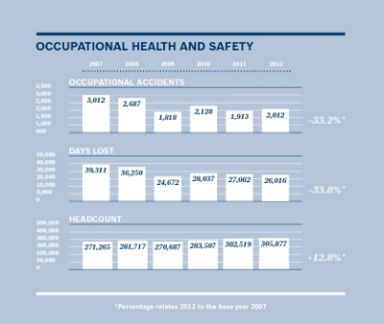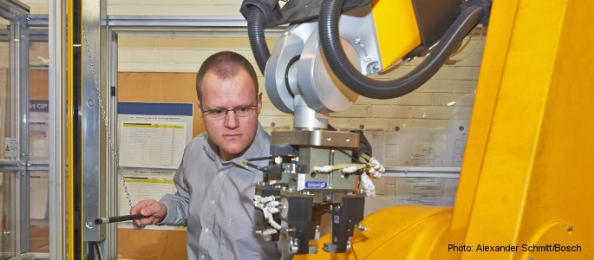Occupational Safety Management – A Systematic Approach to Achieving Success
Occupational health and safety management for associates is one of a company’s key processes. This applies primarily for humanitarian reasons but is also true from an economic perspective. Occupational accidents, illnesses, and diseases are costly for companies and society. Today, technical safety aspects combine with the requirements of ergonomics, user-friendly organization of work, and health protection to form a system-oriented approach to occupational safety.
Efficiently organized occupational safety is becoming an increasingly important competitive factor. Productivity and quality depend crucially on the health and motivation of the workforce. Operating processes can only run smoothly if practical consideration is given to health and safety protection. Effective occupational safety management systems promise the greatest benefit in this respect. In the Bosch Group, we have therefore integrated occupational health and safety management into our management processes and introduced an occupational safety management system that complies with internationally recognized standards. We conduct systematic risk-analyses, detect potential accident and health risks very early, and thus prevent occupational illnesses and diseases. If the hazard sources are known, appropriate preventive measures can be introduced and associates can be given targeted protection. As incidents such as accidents and loss of work are documented, the documentation can be used to compare figures and measure success. It is also possible to agree upon new targets and monitor these.
| Initiator | Bosch Group |
| Project start | 2007 |
| Status | ongoing |
| Region | Worldwide |
| Contact person | Bernhard Schwager |
| Awards | - |
Project benefit
- Health & Safety
- Continuous improvement
| Anti-Corruption | - |
| Business & Peace | - |
| Development | - |
| Environment | - |
| Financial Markets | - |
| Implementing UNGC Principles in your Corporate CSR Management | - |
| Human Rights | - |
| Labour Standards | X |
| Local Networks | - |
| Advocacy of global issues | - |
| Business opportunities in low income communities/countries | - |
| Project funding | - |
| Provision of goods | - |
| Provision of services/personal | - |
| Standards and guidelines development | X |
The Bosch Group occupational safety target
We have enshrined the prevention of occupational accidents, illnesses, and diseases in our principles for work safety and environmental protection throughout the world. The Bosch Group has set long-term targets for reducing the number of accidents. It is looking to achieve a rate of three reportable accidents per million hours worked by 2020. Managers, safety specialists, and occupational health practitioners at all of the approximately 300 manufacturing and development locations around the world are working to achieve this goal and are committed to reaching the targets at all regional and local levels. Quarterly reports on goal achievement are sent from these locations to the respective divisions and to corporate headquarters, which provides support for any measures and campaigns required at the locations. Our international EHS Steering Committee (Environment, Health, and Safety) comprises 15 regional coordinators and manages the worldwide implementation of our strategic goals and standards. This includes the optimization of production processes.
Internal requirements and standards
Binding standards exist for the Bosch Group that lay down minimum requirements for occupational health and safety management. Systematic risk assessments are used at the locations to identify risks for workplaces and activities before necessary protective measures are derived from these for plant and machinery and for handling hazardous substances, for example. Bosch provides managers with training on their duties and responsibilities in occupational health and safety management such as carrying out regular safety instruction for associates on safety-conscious practices. Up-to-date information, guidelines, checklists, and instruction materials for occupational safety and health promotion are supplied for these purposes. Operating instructions are also an important prevention tool. All this ensures that our associates worldwide are informed about risks and protective measures in the workplace.
Positive assessment
Since 2007, Bosch has been implementing an occupational safety management system at all its manufacturing and development locations, thus making it one of the forerunners worldwide in implementing the Occupational Health and Safety Advisory Services 18001 standard. The results have been positive, as this has created a global uniform structure for occupational health and safety and has therefore simplified it.
Bosch principle on occupational health and safety management
Safety in the workplace and the physical well-being of our associates has top priority. National standards for a safe and hygienic work environment are complied with strictly, thus ensuring health and safety in the workplace and a healthy work environment.

Total numbers for accidents and lost days have decreased significantly, confirming that the safety measures taken are having a positive effect. The accident rate fell by approximately 40 percent – from 6.9 in 2007 to 4.2 in 2012; the number of occupational accidents decreased accordingly – from 3,012 in 2007 to 2,012 in 2012. At the same time, the number of associates increased by approximately 13 percent between 2007 and 2012 and is now about 300,000. Lost days have also declined. In 2007, these amounted to 39,311 days, whereas the figure for 2012 was only 26,016, representing a decrease of around 34 percent.
Continuous improvement process
Continuous efforts are needed to maintain these types of reductions on a sustainable basis. Bosch works with specialists in internal and external working groups and committees to develop and improve standards and implements improvement initiatives systematically. We actively involve associate representatives and communicate good practice solutions to all locations to achieve a continuous improvement process. One of the main functions here is to detect potential accident and health risks for associates in order to take appropriate preventive measures in good time.
The safety specialists offer the locations comprehensive advice on all issues relating to plant, process, and operational safety, whether it involves handling individual safety issues, practical solutions for process engineering systems, or support for systematic safety assessments. The specialists also provide support on implementing legal obligations.
This project description was originally presented in the Global Compact International Yearbook 2013.
Bernhard Schwager is Head of Sustainability at Robert Bosch GmbH.
About Bosch Group
The Bosch Group comprises Robert Bosch GmbH and its roughly 350 subsidiaries and regional companies in some 60 countries. If its sales and service partners are included, then Bosch is represented in roughly 150 countries. This worldwide development, manufacturing, and sales network is the foundation for further growth. Bosch spent some 4.2 billion euros for research and development in 2011, and applied for over 4,100 patents worldwide. With all its products and services, Bosch enhances the quality of life by providing solutions which are both innovative and beneficial.
The company was set up in Stuttgart in 1886 by Robert Bosch (1861-1942) as “Workshop for Precision Mechanics and Electrical Engineering.” The special ownership structure of Robert Bosch GmbH guarantees the entrepreneurial freedom of the Bosch Group, making it possible for the company to plan over the long term and to undertake significant up-front investments in the safeguarding of its future. Ninety-two percent of the share capital of Robert Bosch GmbH is held by Robert Bosch Stiftung GmbH, a charitable foundation. The majority of voting rights are held by Robert Bosch Industrietreuhand KG, an industrial trust. The entrepreneurial ownership functions are carried out by the trust. The remaining shares are held by the Bosch family and by Robert Bosch GmbH.
Bosch group focuses on three main business sectors:
- Automotif Technology
- Industrial Technoly
- Consumer goods and Buildings technology
Write a comment about this page
Your comments are provided by your own free will and you take sole responsibility for any direct or indirect liability. In order to maintain the highest discussion quality, all comments will be reviewed by our editors. You hereby provide us with an irrevocable, unlimited, and global license for no consideration to use, reuse, delete or publish comments in accordance with our Community Guidelines.
About Us // Privacy Policy // Copyright Information // Legal Disclaimer // Contact
Copyright © 2012-2018 macondo publishing GmbH. All rights reserved.
The CSR Academy is an independent learning platform of the macondo publishing group.









